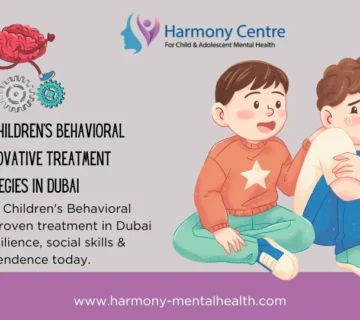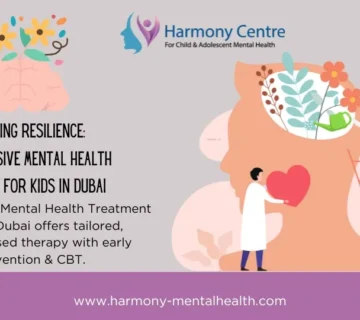Parent Child Communication Dubai: Strengthening Family Bonds at Harmony Centre
Enhance parent-child communication in Dubai with expert tips from Harmony Centre. Discover strategies for active listening, open dialogue, and stronger family connections.
Contact Information
| Contact Method | Details |
|---|---|
| Phone | +971 (52) 8773268 / 04 558 2015 |
| Click Here | |
| info@harmony-mentalhealth.com | |
| Address | Office 409, Building Alrazi-64C, 26th St, Healthcare City, Dubai |
Introduction
Effective communication is the cornerstone of strong family relationships. In Dubai’s fast‑paced and diverse environment, parents face unique challenges in maintaining open dialogue with their children. At Harmony Centre Mental Health Dubai, we believe that improving parent-child communication not only fosters emotional well‑being but also strengthens family bonds and supports children’s overall development. Our evidence‑based, culturally sensitive approach equips families with practical strategies to enhance communication, resolve conflicts, and create a nurturing home environment.
Learn More About Harmony Centre • Contact Us
Understanding Parent-Child Communication
What Is Parent-Child Communication?
Parent-child communication involves the exchange of thoughts, feelings, and ideas between parents and children. It is a dynamic process that evolves as children grow, influencing their emotional, social, and cognitive development. Clear and effective communication can reduce misunderstandings, build trust, and empower children to express themselves confidently.
Key Elements
- Active Listening:
Fully engaging with your child’s words and emotions. - Open Dialogue:
Encouraging honest and respectful conversations. - Empathy:
Understanding and validating your child’s feelings. - Consistent Feedback:
Providing constructive responses and guidance.
Why It Matters in Dubai
Dubai is a melting pot of cultures where diverse parenting styles and expectations converge. Effective parent-child communication is particularly crucial in this multicultural setting because it:
- Bridges Cultural Differences:
Ensures that cultural values are respected while addressing universal emotional needs. - Enhances Adaptability:
Helps children navigate a fast‑paced, competitive environment with confidence. - Supports Academic Success:
Open communication can improve behavioral outcomes and academic performance. - Fosters Resilience:
Equips children with the skills to cope with challenges and stress.
Strategies to Enhance Parent-Child Communication
1. Active Listening
What Is Active Listening?
Active listening means giving your full attention to your child when they speak. It involves making eye contact, nodding, and responding thoughtfully. This practice shows your child that their words matter and that you value their feelings.
How to Practice Active Listening
- Eliminate Distractions:
Turn off electronic devices and focus solely on your child during conversations. - Paraphrase and Reflect:
Repeat what your child has said in your own words to confirm understanding. - Ask Open-Ended Questions:
Encourage deeper conversations by asking questions that require more than a yes or no answer. - Show Empathy:
Validate your child’s emotions by acknowledging their feelings without judgment.
Transition: With active listening as a foundation, let’s explore other techniques to further improve communication.
2. Establishing Open Dialogue
Encouraging Open Dialogue
Open dialogue creates a safe space where children feel comfortable sharing their thoughts and feelings. It is about being approachable and responsive, which builds trust over time.
Tips for Fostering Open Dialogue
- Daily Check-Ins:
Set aside a few minutes each day to ask about your child’s day. This can be during dinner or before bedtime. - Non-Judgmental Responses:
Avoid immediate criticism or judgment when your child shares their thoughts. - Use “I” Statements:
Communicate your feelings and thoughts clearly by using statements like “I feel…” rather than “You always…” - Share Your Own Experiences:
Model openness by discussing your own feelings and challenges in an age-appropriate way.
Transition: As dialogue improves, the next step is to enhance the emotional connection through empathy and support.
3. Building Empathy
The Role of Empathy in Communication
Empathy involves understanding and sharing the feelings of another. When parents empathize with their children, it not only validates the child’s emotions but also strengthens the bond between them.
How to Cultivate Empathy
- Acknowledge Emotions:
Let your child know that it’s okay to feel sad, angry, or confused. Statements like “It sounds like you’re really upset” can be very powerful. - Encourage Perspective-Taking:
Help your child consider how others might feel in different situations. - Model Empathetic Behavior:
Demonstrate empathy in your own interactions, whether with your child or others. - Use Storytelling:
Share stories that highlight empathy and the importance of understanding others’ emotions.
Transition: With empathy established, continuous engagement and reinforcement are vital for long-lasting improvements.
4. Consistent and Constructive Feedback
Why Feedback Matters
Constructive feedback is essential for reinforcing positive behavior and guiding children towards better communication skills. It helps children understand what they’re doing well and where they can improve.
How to Provide Effective Feedback
- Be Specific:
Instead of saying “Good job,” say “I really appreciate how you listened to your friend today.” - Focus on Effort:
Praise the effort your child puts into communicating, rather than just the outcome. - Offer Solutions:
If you notice a problem, discuss ways to address it together rather than simply pointing it out. - Keep It Positive:
Maintain a positive tone, even when offering criticism, to ensure that feedback is constructive and encouraging.
Transition: While feedback is a continuous process, maintaining consistency in communication practices at home, school, and within the community is key.
Integrating Communication Strategies Across Settings
For Families
Create a Communication-Friendly Home Environment
- Family Meetings:
Hold regular meetings where everyone, including children, is encouraged to share their thoughts and feelings. - Open-Door Policy:
Encourage your child to approach you with concerns at any time, reinforcing that you are always available to listen. - Engage in Shared Activities:
Activities like cooking together, playing board games, or taking walks can naturally foster conversations and strengthen relationships.
Learn More About Harmony Centre • Contact Us
For Educators
Enhance Classroom Communication
- Implement SEL Programs:
Social-Emotional Learning (SEL) curricula can help students develop communication and empathy skills. - Classroom Discussions:
Create structured opportunities for students to share their experiences and ideas in a safe, supportive setting. - Collaborate with Parents:
Regular meetings with parents ensure that communication strategies are reinforced both at home and in the classroom.
For the Community
Promote Public Initiatives on Family Communication
- Workshops and Seminars:
Attend community events focused on enhancing family communication and building stronger parent-child relationships. - Support Groups:
Join or form local support groups where families can share tips, experiences, and resources related to effective communication. - Digital Outreach:
Utilize online platforms, webinars, and social media to disseminate information and strategies on improving parent-child communication.
Explore Our Community Initiatives
Get in Touch
Evidence-Based Outcomes and Success Stories
Quantitative Improvements
Our evidence-based strategies have led to measurable improvements:
- Enhanced Listening Skills:
Studies show that families who practice active listening report a 30–40% improvement in effective communication. - Reduced Behavioral Issues:
Consistent open dialogue is associated with a decrease in behavioral problems by up to 25%. - Improved Academic Performance:
Better communication at home correlates with improved concentration and academic success.
Qualitative Success
Real-life testimonials underscore the impact of improved parent-child communication:
“Since we started using the communication techniques from Harmony Centre, our family bonds have strengthened, and my child is much more open about their feelings.”
– Parent Testimonial
“The active listening strategies taught by Harmony Centre have transformed the way we interact with our children. There’s been a remarkable improvement in our home atmosphere and my child’s confidence.”
– Parent Testimonial
For more information on effective communication, visit the American Psychological Association (external link).
Frequently Asked Questions about Parent Child Communication Dubai
Book a Consultation Now
Contact Information
Office Address:
Office 409, Building Alrazi-64C, 26th St, Umm Hurair 2, Dubai Healthcare City, Dubai
Phone:
+971 4 558 2015
+971 5 287 73268
Email:
info@harmony-mentalhealth.com
Final Thoughts about Parent Child Communication Dubai
Effective parent-child communication is a powerful tool in building strong, supportive family relationships. At Harmony Centre Mental Health Dubai, our evidence-based, multidisciplinary approach equips families with practical strategies to enhance communication, foster emotional well-being, and empower children to thrive. By actively engaging in open dialogue, practicing active listening, and integrating culturally sensitive techniques, you can create a nurturing environment that supports your child’s growth and development.
Invest in your family’s future by prioritizing communication and building lasting bonds. Choose Harmony Centre as your trusted partner in creating a supportive, resilient, and connected home in Dubai.
Learn More About Harmony Centre
Get in Touch
👉 Book a Consultation Now: Call +971 4 558 2015 or visit www.harmony-mentalhealth.com.
Join our online community and stay updated with our latest events, articles about Parent Child Communication Dubai



